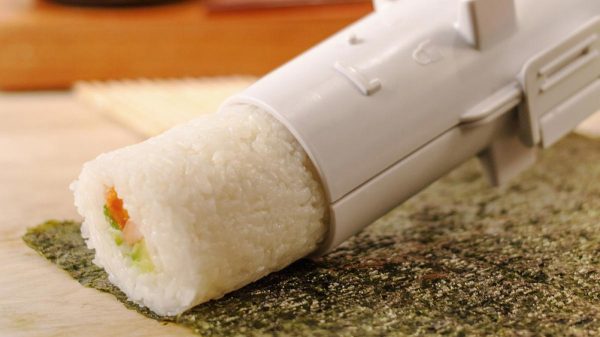Does sushi make you gain weight?

In the world of gastronomy, sushi occupies a special place, both for its delicate flavor and its refined aesthetic. However, one question often comes up: Does eating sushi make you gain weight? With its combination of vinegared rice, raw fish, vegetables and seaweed, sushi seems like a healthy food choice. However, answering this complex question requires an in-depth exploration of the nutritional components of sushi, its typical serving sizes, and how it fits into a balanced diet. In this article, we'll take a closer look at the weight implications of eating sushi and share tips for balanced, mindful eating.
1 – Portions and choice of ingredients
The first important consideration when determining whether eating sushi can cause weight gain is portion size and the ingredients used in its preparation. Sushi is often served in small portions, which may seem like a light and healthy option. However, it is essential to take into account the number of sushi consumed and the ingredients that compose them.
Vinegared rice, a sushi staple, can be an important source carbohydrates and calories. Sushi with high-fat toppings, such as salmon or avocado, can also add extra calories. Additionally, sushi fried or prepared with sweet sauces may be higher in calories and fat.
By choosing sushi with lighter toppings, such as tuna or cucumber, and opting for simpler rolls without frying or sauce, it is possible to reduce calorie intake while still enjoying the delicate flavors of this Japanese dish. By being aware of portion sizes and ingredient choices, it is possible to enjoy sushi in a balanced and moderate way, without compromising your health and weight goals.
2 – Calories and nutritional values of sushi
When considering the impact of sushi on weight, it is crucial to understand its caloric content and nutritional values. Sushi can vary greatly in calories depending on its ingredients and preparation. For example, a sushi roll traditionally made with rice, raw fish, and nori seaweed may be relatively low in calories, mainly due to its small size and simple composition.
However, certain types of sushi, such as fried sushi, sushi made with excessively sweet white rice, or those topped with mayonnaise or spicy sauces, can be much higher in calories. Moreover, portion size may vary from restaurant to restaurant, which can significantly influence total calorie intake.
When it comes to nutritional values, sushi can be a source of lean protein from raw fish or seafood, as well as carbohydrates from vinegared rice. The nori seaweed used to wrap sushi is also rich in essential minerals such as iodine. However, sushi can often lack vegetables or other sources of fiber and essential nutrients, which may be something to consider for a balanced diet.
Ultimately, managing the calorie intake and nutritional values of sushi will depend on the ingredient choices and serving sizes selected, as well as the frequency of consumption. By adopting a conscious and moderate approach, it is possible to integrate sushi into a healthy and balanced diet.
3 – Consumption and health alternatives
To maintain nutritional balance while enjoying sushi, it is important to adopt conscious consumption strategies and explore healthy alternatives.
Moderation: Consuming sushi in moderation is essential to avoid overconsumption of calories. Limit the frequency and quantity of sushi consumed during meals to maintain a calorie balance.
Opt for light alternatives: Choose lighter sushi options, favoring rolls made with lean fish, fresh vegetables and brown or whole grain rice. Avoid fried toppings, high-fat sauces, and calorie-laden sushi.
Add Healthy Sides: Round out your sushi meal with healthy sides such as green salads, crunchy vegetables or light soups to increase your intake of fiber and essential nutrients.
Opt for vegetarian alternatives: Explore vegetarian sushi options by choosing rolls made with vegetables, avocado, tofu or mushrooms for an alternative lighter and rich in nutrients.
Practice self-control: Be aware of your food choices and portions by practicing self-control when enjoying sushi. Savor every bite and stop when you are satisfied, thus avoiding overconsumption.
By adopting these mindful eating strategies and exploring healthy alternatives, you can enjoy the delights of sushi while maintaining a balanced and healthy eating lifestyle.
Conclusion
In conclusion, the question of whether eating sushi makes you fat cannot be approached in a simplistic way. Sushi, with its combination of vinegared rice, raw fish, seaweed and other ingredients, offers a delicious and often perceived healthy dining option. However, their impact on weight largely depends on serving sizes, ingredient choices and frequency of consumption.
By adopting a mindful and balanced approach, it is entirely possible to enjoy sushi in moderation while maintaining a healthy eating lifestyle. By choosing lighter options, controlling portions and exploring health alternatives, you can enjoy sushi without compromising your weight and health goals.
Ultimately, enjoying sushi is part of a varied and balanced eating lifestyle, in which moderation and awareness play a key role. By making informed choices and adopting conscious consumption strategies, you can fully enjoy this delicious Japanese specialty while maintaining your overall well-being.



